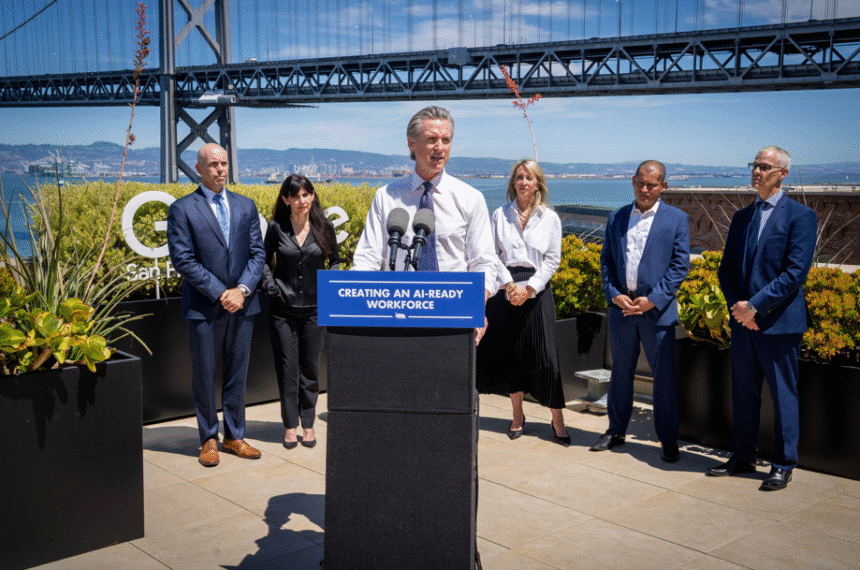California’s GenAI economy
California is home to 33 of the top 50 privately held AI companies around the globe. That figure signifies the state’s undisputed leadership in the GenAI arena and highlights why it is critical that California continues to create economic opportunities for our students and integrate these partnerships into educational systems statewide. The agreements will help ensure California remains the location of choice for the world’s most innovative companies by placing an emphasis on supporting startups — a critical component of the state’s economic engine.
Recognizing GenAI is only the tip of the spear in the world of emerging technologies, the state is placing increased emphasis on sharpening students’ skills to keep them competitive in today’s workforce and ensure they use these emerging technologies safely and responsibly.
Preparing tomorrow’s innovators
Adobe, Google, IBM, and Microsoft have developed several programs they are sharing with educational institutions across the state, including providing cutting-edge AI software, sharing expertise as educators update curricula to reflect the latest technology, and supporting educational and joint research initiatives. This partnership will drive significant advances in educational opportunities, economic development, workforce enhancement, and innovation for all Californians. The solutions are voluntary and will be made available by the companies at no cost to schools and institutions.
Adobe Initiative: Adobe and California are partnering to equip students and teachers with the skills and resources they need to thrive in an AI-driven world. Building on Adobe’s long-standing commitment to supporting education, this initiative will expand access to Adobe’s responsibly developed generative AI that is designed to be used in classrooms such as Adobe Express, Adobe Acrobat, and Adobe Firefly – as well as AI literacy content, programming and resources. This partnership will help ensure workforce readiness for the future by preparing students to become the next generation of innovators and leaders. View the Adobe MOU here.
“To create the future, today’s students must learn to speak the language of tomorrow. That means not only having access to Adobe’s world-class, classroom-ready AI-powered tools as they are creating, ideating, or studying, but also becoming fluent in AI itself. This is equally important for educators because when we invest in teachers, we invest in every student they will ever reach. By empowering both students and educators with AI skills and knowledge, Adobe is proud to take a critical step toward building an innovative workforce that thrives in the digital world of today and tomorrow.” Mala Sharma, Vice President and General Manager, Adobe for Education.
Google Initiative: Google will help California residents develop tech skills through its extensive online AI training programs and continue to partner with government agencies across the state to transform citizen services, make data-driven decisions, and enhance efficiencies using GenAI. As a partner in this initiative, Google will support the state’s commitment to modernizing government and investing in its workforce. This includes increasing access to Google’s Prompting Essentials course for students at no cost. Designed and taught by experts at Google, the online course is product agnostic, does not require a degree or experience, and teaches learners how to effectively instruct AI, make the technology work for them, and responsible use. Additionally, Google will offer its no-cost Generative AI for Educators course to teachers across the state to help them personalize instruction to meet student needs, develop creative lessons and activities, and save time on administrative tasks. This partnership builds on collaboration between California and Google to accelerate the adoption of GenAI at government agencies in the state and create new upskilling opportunities for the workforce. View the Google MOU here.
“Generative AI is reshaping the future of work, revolutionizing industries and creating entirely new career paths,” said Matthew Schneider, Managing Director, Education, State & Local Government, Google Public Sector. “By collaborating with California to make this technology more accessible to K-12 classrooms, higher education institutions, and innovative start-ups, we’re empowering Californians with the skills and knowledge to thrive in the robust GenAI economy of tomorrow.”
IBM Initiative: This initiative aims to integrate AI into career education programs across California’s community colleges, explore opportunities for faculty training, and broaden access to industry-recognized credentials through IBM SkillsBuild. The initiative also seeks to promote the development of regional AI labs, short-term certificates, and hands-on learning experiences aligned with evolving workforce needs. By aligning proven, accessible educational pathways with the demands of a rapidly changing technological landscape, this collaboration aspires to help prepare students for future roles in AI, cybersecurity, and data science fields. View the IBM MOU here.
“IBM is proud to collaborate with the State of California to expand access to AI education and economic opportunity. As AI transforms the workplace, the demand for skilled workers is growing rapidly. Through IBM SkillsBuild and our collaboration with California’s community colleges, we are empowering students and educators with the tools, training, and credentials they need to thrive in an AI-driven economy.” Dinesh Nirmal, Senior Vice President, IBM Software.
Microsoft Initiative: Microsoft, the Foundation for California Community Colleges, and the California Community College Chancellor’s Office successfully delivered a comprehensive bootcamp learning series focused on AI Foundations, Cybersecurity, and Microsoft Copilot. This training equipped faculty members from various community colleges across the state to educate students at their respective colleges. This collaborative effort has significantly enhanced the AI and cybersecurity skills of both faculty and students, positioning California’s community colleges at the forefront of technological education. View the Microsoft MOU here.
“Microsoft is proud to partner with the State of California to help ensure students, faculty, and staff across the California Community Colleges system have access to the AI skills needed in today’s workforce. By supporting AI literacy, cybersecurity training, and hands-on learning opportunities through our Copilot technology and trusted training partners, we’re investing in the future of California. We’re grateful to Governor Newsom’s office and the California Government Operations Agency for their leadership in creating pathways into the digital workforce.” Beth Dann, General Manager, State, Local, and Education, Microsoft
What’s Next
Key leadership from this newly announced partnership will begin the implementation phase, continuing their efforts to harness GenAI to enhance the lives of all Californians.
California’s AI global leadership
California has launched efforts to help the state take advantage of this emerging technology, while also creating responsible policy guardrails to protect Californians.
In 2023, Governor Newsom signed an executive order laying out California’s approach to state GenAI adoption. That EO has shaped the future of ethical, transparent, and trustworthy GenAI deployment, all while California remains the world’s GenAI leader. Within state government, projects are already underway to utilize GenAI to reduce highway congestion, improve roadway safety, and enhance customer service in a state call center, among other new initiatives.
Paving the way for responsible use of AI
Earlier this year, Governor Newsom further advanced California’s ongoing leadership in the responsible development and deployment of AI with the release of a new report from world-leading AI academics and experts. The group, which was convened at the request of the Governor last September, today released its final report, The California Report on Frontier AI Policy. This landmark report will help pave the way for the responsible, ethical, and safe use of AI for the benefit of all Californians by offering a policy framework for workable guardrails based on an empirical, science-based analysis of the technology’s capabilities and risks.











